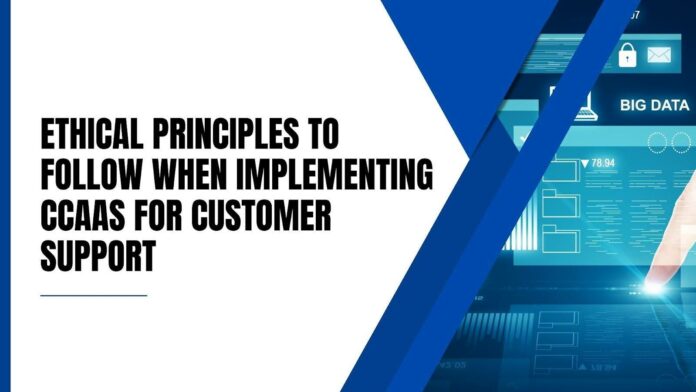CCaaS ‘s powerful CRM capabilities provide businesses with immense potential to transform customer service operations. However, with any powerful technology, reflecting on ethical considerations is essential during implementation.
In this article, we’ll explore key ethical principles to uphold when leveraging CCaaS for customer support functions. By proactively addressing areas like data handling, algorithmic bias, transparency, and compliance, businesses can earn customer trust and build an ethically sound foundation for CCaaS success.
Selecting Data Sources and Collection Methods
The first step in an ethical CCaaS implementation is ensuring data collection methods respect privacy and obtain proper consent. Some best practices include:
- Communicating what data is being gathered, and for what purposes. Transparency builds trust.
- Providing easily accessible data usage policies outlining collection practices.
- Giving customers robust opt-in and opt-out choices for data sharing.
- Obtaining explicit, proactive consent before collecting and using customer data in new ways.
- Allowing customers to revoke consent conveniently.
- Carefully screening data sources. Never use illegally obtained or unethically sourced data. Adhering to these principled data-sourcing practices demonstrates your commitment to honoring customers as partners, not just data sources.
Data Handling and Storage
Once data is collected, securing it properly and limiting retention is paramount. Recommended practices:
- Encrypt sensitive customer data both in transit and at rest.
- Implement access controls, tracking logs, and employee training to reinforce security.
- Ensure compliance with all applicable data protection laws and regulations. Conduct regular audits.
- Establish mandatory data retention policies aligned to business needs, with defined deletion timelines.
- Anonymize or pseudonymize data where possible to minimize risk.
- Classify data by sensitivity, and restrict access accordingly. Robust security, compliance, limited retention, and responsible controls build customer trust in data stewardship. Using a CCaaS solution can help organizations securely collect, analyze, and act on customer data while maintaining compliance.
Ethical Use of Customer Data
Optimizing the customer experience often involves personalization powered by customer data. However, ethical principles still apply:
- Provide customers with ready access to review, correct, and delete personal data held in your systems per data protection laws.
- Allow customers to easily export their data for portability to other services.
- Obtain clear, granular consent for any secondary uses of data like marketing communications.
- Never share or sell customer data to third parties without explicit permission.
- Limit personalization to areas that benefit the customer rather than areas that could disadvantage or manipulate certain groups.
Integrating ethical considerations into the use of customer data, when employing CCaaS call center integration is essential for enhancing the customer experience while upholding privacy and compliance standards.
It has robust capabilities in managing and analyzing customer data and comes with a responsibility to respect individual privacy rights and adhere to regulations. It provides tools for transparent data governance, allowing customers to access and control their data in compliance with data protection laws.
Avoiding Discrimination and Bias
With AI influencing more decisions, addressing algorithmic bias is imperative:
- Perform regular bias detection audits on analytics and recommendation models. Quantify outcomes by user demographics to identify issues.
- Leverage diverse, inclusive data sets when training AI systems to prevent learned bias.
- Act quickly to correct AI bias by retraining models and tweaking input data and algorithms.
- Provide bias and ethics training for teams building AI models and making data-driven decisions.
- Have human oversight mechanisms to flag potentially biased system behaviors for review.
Ongoing bias detection, diverse training data, and human oversight together help prevent discriminatory outcomes.
Ensuring Transparency and Accountability
Maintaining transparency around AI keeps customers informed and builds trust:
- Provide clear explanations of how AI systems work and impact customers. Explain the rationale behind AI-driven suggestions, decisions, and outcomes in plain language upon request.
- Enable users to view the key data factors, logic, and techniques that influenced the AI’s outputs. Avoid overly opaque “black box” systems.
- Establish easily accessible and visible mechanisms for disputing problematic or unfair AI-generated outcomes based on incorrect data, biased results, or other issues. Respond promptly.
- Implement rigorous documentation practices around data sources, data processing, model designs, training techniques, and algorithmic logic to support internal and external transparency.
- For high-impact AI systems, have accountable humans involved in reviewing algorithms, examining data sources for bias, and designing an ethical development process.
- Conduct algorithmic audits periodically to assess systems for fairness, bias, and accuracy. Be proactive in understanding and mitigating risks.
- Provide transparency reports to share information on how AI systems are built, tested, and improved over time. Disclose complications, limitations, and steps taken to address them.
Proactive information sharing, accountability mechanisms, and responsible AI practices build understanding and trust. Ongoing transparency enables constructive feedback to continuously improve AI responsibly.
Regular Ethical Audits and Reviews
Maintaining high standards requires ongoing self-evaluation:
- Build a schedule of regular audits to assess ethical risks and compliance in areas like data practices, algorithmic bias, transparency, and data security.
- Be proactive about evaluating new features for potential ethical impacts before launch.
- Learn from past failures by conducting blameless post-mortems that identify process improvements.
- Adapt swiftly to evolving societal standards and regulations around ethics and data.
- Maintain an ethics-focused team responsible for advising on concerns across the organization.
A culture focused on continuous ethical improvement will best manage risks as technology and challenges evolve.
Conclusion
CCaaS offers immense possibilities to transform customer engagement. But possibility must be tempered by ethical responsibility.
Companies willing to grapple with difficult questions around data ethics, bias, transparency, and human well-being will build the trust needed to succeed in the long term. Our customers are ultimately our partners. When CCaaS is implemented ethically with their interests at heart, everyone benefits.
Frequently Asked Questions (FAQ)
- How can we ensure that our customer support CCaaS implementation remains ethically sound over time?
Regular ethical audits and reviews are essential to maintain ethical standards. Conduct periodic assessments, adapt to evolving ethical standards, and learn from past ethical failures to ensure ongoing compliance.
- What are the key considerations for handling customer data ethically within CCaaS for customer support?
Ethical data handling involves securing data, complying with data protection regulations, and implementing transparent data usage policies. Additionally, it requires honoring data rights, preventing data misuse, and allowing customers access and control over their data.
- How can we address bias and discrimination in our CCaaS customer support system’s AI components?
Addressing bias and discrimination requires implementing bias-free algorithms through regular bias audits and diverse data training. It’s also essential to proactively monitor for discriminatory outcomes and take prompt corrective actions when issues arise.







